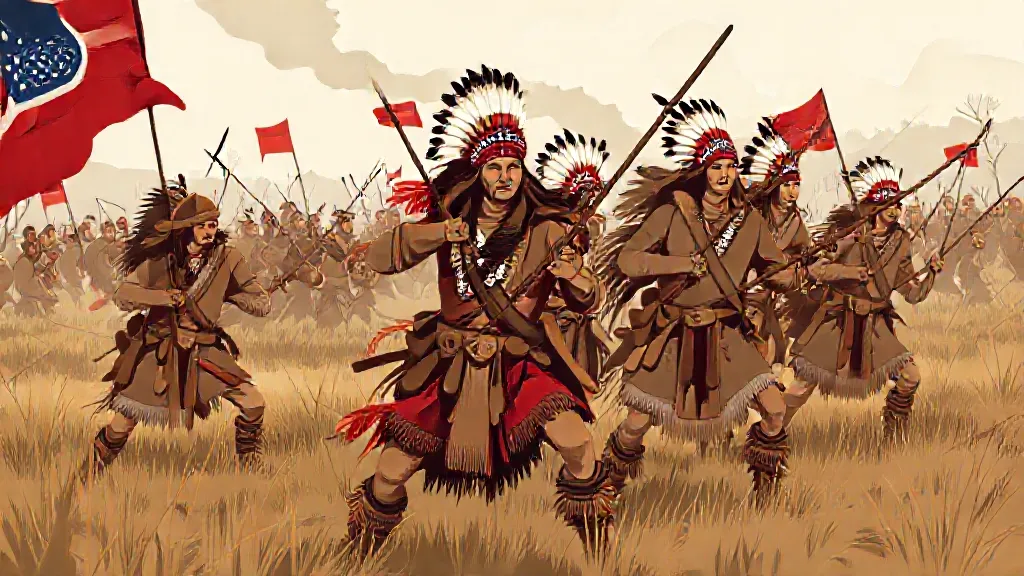The American Revolutionary War (1775-1783) was not just a conflict between the thirteen colonies and Great Britain; it was a complex tapestry of alliances, conflicts, and interactions involving various groups, including Native Americans. The role of Indigenous peoples in this pivotal moment in history is often overlooked, yet it is crucial to understanding the broader narrative of the American Revolution. Native Americans were not merely passive observers; they were active participants, influencing the outcome of the war and the future of their lands.
The Diverse Alliances of Native American Tribes
Different tribes aligned themselves with either the British or the American colonists, driven by their interests and the promise of land and autonomy. The Iroquois Confederacy, a powerful alliance of six nations, was particularly influential. While some tribes, like the Mohawks, sided with the British, others, such as the Oneida, supported the American cause.
This division created a significant rift within the Confederacy, showcasing how the war forced Indigenous groups to navigate complex political landscapes and make difficult choices that would impact their communities for generations.
Motivations Behind Native American Participation
The motivations for Native American involvement in the Revolutionary War were multifaceted. Many tribes sought to protect their lands from encroaching settlers, believing that a British victory might better secure their territorial claims.
Conversely, some tribes viewed the revolution as an opportunity to align with the colonists in hopes of gaining autonomy and a greater voice in governance. The promise of land, resources, and alliances with either side played a crucial role in shaping Native American strategies during the war.
Military Contributions and Strategies
Native Americans contributed significantly to military operations during the Revolutionary War.
They were skilled fighters, utilizing guerrilla tactics that often caught colonial forces off guard. Tribes such as the Shawnee and the Delaware engaged in raids against American settlements, while others provided critical intelligence to British forces. Their knowledge of the terrain and ability to mobilize quickly made them valuable allies, demonstrating that Indigenous military strategies were essential to the conflict's dynamics.
The Impact of the War on Native American Communities
The Revolutionary War had profound implications for Native American communities. Regardless of their alliances, many tribes faced devastating consequences, including loss of life, displacement, and the erosion of their lands. The Treaty of Paris in 1783, which ended the war, largely ignored Indigenous interests, leading to further encroachments by settlers into Native territories.
This disregard for Native American rights would set a precedent for future U.S. policies, highlighting the ongoing struggles faced by Indigenous peoples in the wake of the war.
Cultural Resilience and Adaptation
Despite the challenges posed by the Revolutionary War, Native American communities demonstrated remarkable resilience and adaptability. Many tribes sought to preserve their cultural identities while navigating the new political landscape. Some engaged in diplomatic efforts, seeking to establish treaties that would protect their rights and lands.
This period of adaptation was critical in shaping the future of Indigenous nations and their ongoing struggle for sovereignty and recognition.
Legacy of Native American Involvement
The legacy of Native American involvement in the Revolutionary War is complex. While their contributions were significant, the subsequent policies of the United States often marginalized Indigenous peoples.
The war marked a turning point, as the new nation expanded westward, frequently at the expense of Native American lands and autonomy. Understanding this legacy is essential for recognizing the historical injustices faced by Indigenous communities and the continuing impact of these events on contemporary Native American life.
Further Reading and Resources
For those interested in exploring this topic further, numerous resources provide in-depth analysis and perspectives on Native American involvement in the Revolutionary War.
Books such as "The Iroquois in the American Revolution" by Barbara Graymont and "The Native American Experience" by Peter C. Mancall offer valuable insights into the complexities of Indigenous participation in the conflict. Additionally, academic journals and online databases provide access to primary sources and scholarly articles that delve deeper into this often-overlooked aspect of American history.
Conclusion: A Call for Recognition
In conclusion, the role of Native Americans in the Revolutionary War is a crucial chapter in the broader narrative of American history. Their involvement was driven by a desire to protect their lands, preserve their cultures, and navigate the shifting political landscape of the time. Recognizing and honoring this history is essential for understanding the ongoing struggles of Native American communities and the complexities of their relationship with the United States.
As we reflect on the Revolutionary War, it is imperative to acknowledge the contributions and sacrifices of Indigenous peoples, ensuring that their voices are heard and their stories are told.
